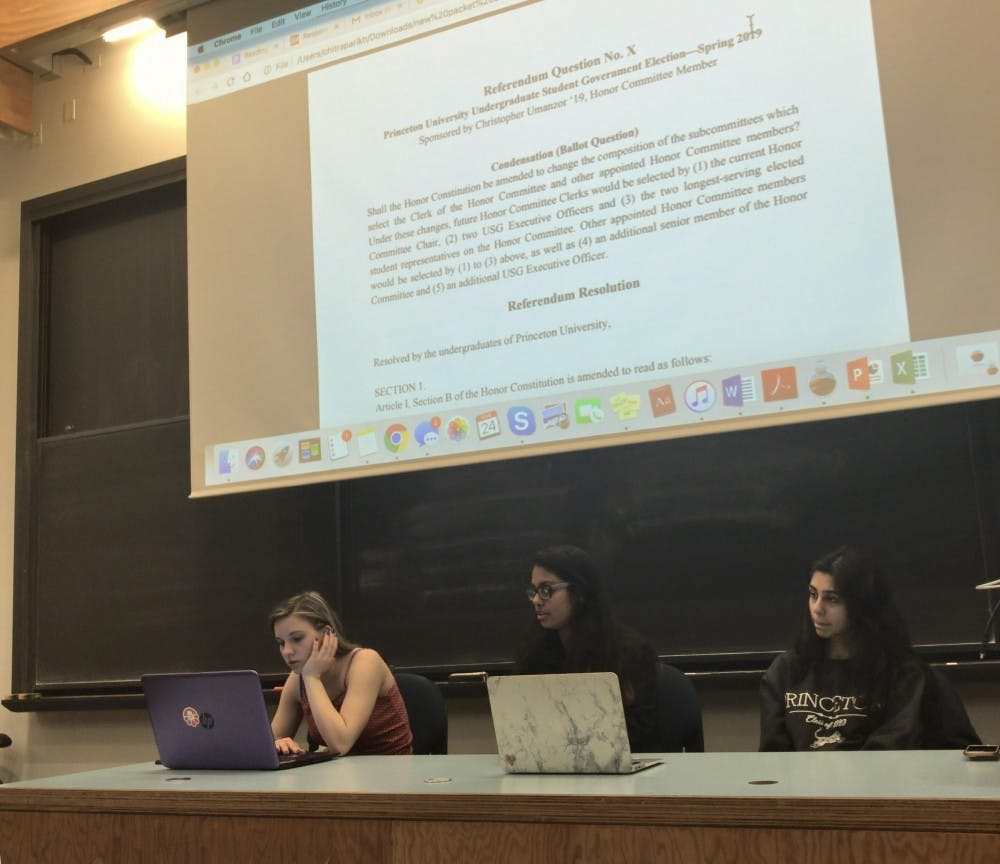The Undergraduate Student Government (USG) reviewed the language for student referenda on Honor Committee penalties and appointments at its weekly meeting on March 24.
USG members discussed five referenda concerning Honor Code reform, eye health, and renaming USG.
Honor Committee Chair Emeritus Elizabeth Haile ’19 introduced a referendum on behalf of the Joint Honor Committee and USG Academics Subcommittee on Academic Integrity Reconciliation Report Implementation that would allow the Honor Committee to make use of an increased variety of penalties.
According to Haile, the referendum would shift away from the “standard penalty paradigm” toward a graduated penalty paradigm. Currently the standard penalty is a one-year suspension, but the proposed potential penalties would add a reprimand for writing over time and a one-semester suspension option.
The Senate approved the language of this referenda.
Recruitment Coordinator for the Honor Committee Chris Umanzor ’19 introduced a referenda to change the composition of the subcommittees that select the Clerk of the Honor Committee and other appointed Honor Committee members.
Umanzor described the change as a “functional amendment” that aimed to increase the proportion of elected members on the Honor Committee.
“From a normative perspective, this is a committee run for the students by the students,” he said. “It makes sense to ensure that there is a good number of elected student representatives.”

AJ Sibley ’19 presented another referendum asking undergraduates to call on the University administration to establish an annual health-awareness initiative that would educate students on the health threat that screen use poses to the eyes and to install on campus computers blue light protection software.
In an email to the student body, Sibley wrote that he “fried out” his eyes by simply studying on his computer for too long.
“We are all severely damaging our eyes using computer screens. It hasn’t hit sufficient numbers to gain mainstream awareness,” Sibley said. “Within five or 10 years we’re going to be having this in epidemic proportion.”
The Senate unanimously approved the language of this referenda.

Bozhidar Stankovikj '20, President of the Macedonian Association, presented a referendum that requested USG Senate change its name to “Government Club.”
Stankovikj cited the need to lessen the barrier to entry students might feel when confronted with the acronym USG. He suggested that the use of the word “club” in the title of the Senate would make it more approachable.
University Life Chair Nico Gregory ’22 described the matter as “not something that’s pressing.”
According to USG Parliamentarian Jonah Hyman ’20, referenda are rarely deemed frivolous, but this meeting proved an exception. All but one member of the Senate voted to deem Stankovikj’s referendum frivolous.
Claire Wayner ’22 introduced a referendum on behalf of the Princeton Student Climate Initiative that sought to establish a task force to develop a strategy for tracking campus emissions on a broader basis, actively engage students more thoroughly on the University’s goal to become carbon neutral by 2046, and set benchmarks for the goal of carbon neutrality.
“We’re worried that the 2046 date might slip by and administrators might drag their feet,” Wayner said, noting that many students on campus are not yet aware of the University’s climate goals.
The Senate unanimously approved the language of this referenda.
For each proposed referenda, the Senate should look for wording that would “clearly and neutrally describe the resolution,” according to Hyman.
In its consideration, the Senate could either vote to approve, disapprove, or deem a resolution “frivolous.”
Sponsors of referenda will have the chance to collect signatures from the student body for a petition to have the referendum measure appear on the ballot during the USG election. Approved referenda will have to collect signatures from 10 percent of the student body over the next week, while the “frivolous” referendum will have to collect signatures from 30 percent of the student body over the next two weeks to appear on the ballot.
The Senate meeting was held in Lewis Library 138 at 8 p.m.








